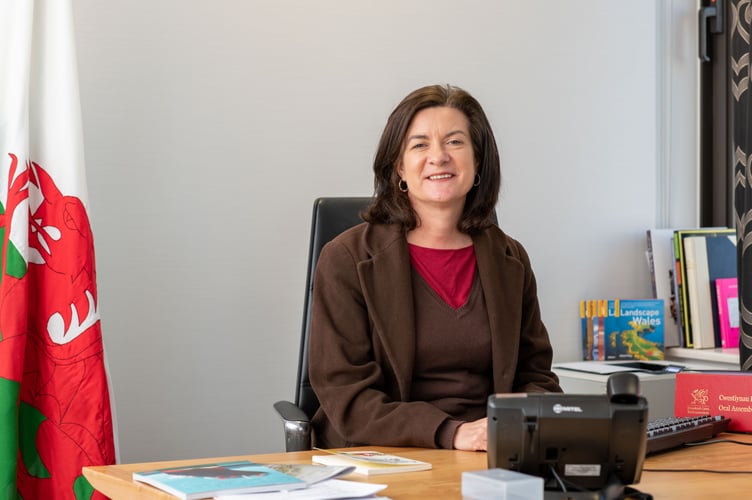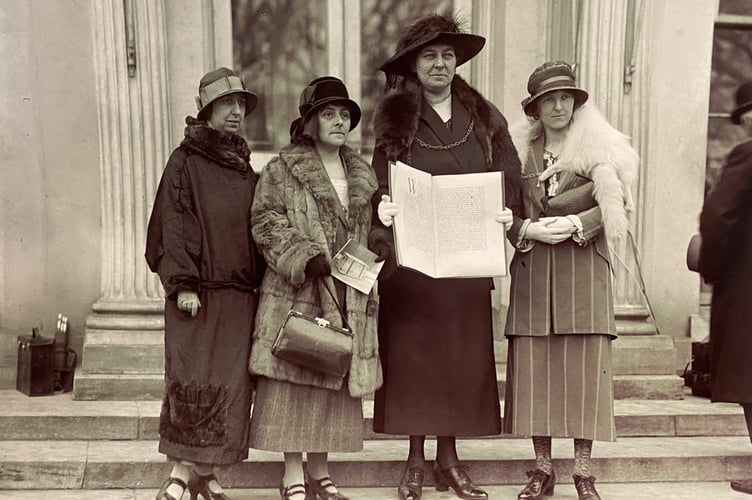At a special ceremony later this week, a purple plaque will be unveiled in Aberystwyth to commemorate the contribution made by Annie Hughes Griffiths, the organiser of the ‘Welsh Women's Peace’ Campaign a hundred years ago, writes Member of the Senedd, Eluned Morgan.
In 1923/4, at a time when the world was still reeling from the devastating experiences of the First World War, a remarkable movement emerged in the heart of Wales. The women of this resilient nation, their spirits unbroken by the horrors of conflict, decided to unite in pursuit of a better world.
This dedicated group of women orchestrated a ground-breaking initiative. Their mission was to gather, support and advocate for global peace. To achieve this, they embarked on an ambitious endeavour, a petition signed only by women, was aimed at urging the United States to take a leading role in the newly established League of Nations.
Driven by a collective yearning to ensure that the atrocities of the past would not be repeated, they achieved an extraordinary feat - they managed to gather an astonishing 390,296 signatures on their petition- it was apparently around 7 miles in length! These signatures were not just ink on paper; they represented the hopes and dreams of countless women in Wales who shared a vision for a world where conflicts could be resolved through diplomacy, co-operation, and dialogue.

Among those who helped to organise this monumental effort was my own great aunt, Auntie Dil.
Her involvement in this historic movement serves as a poignant reminder of the personal connections we have to the pages of history and the desire this rekindles in some women in Wales today to call for peace.
A century has passed since that historic peace petition of 1923, and now, today the world watches yet another conflict unfold across the Middle East. Every day we bear witness to the devastating scenes of anguish, suffering and destruction that fill our screens on both sides of the conflict.
The toll of innocent suffering escalates as this deeply intricate conflict unfolds. Those innocents who yearn for peace and stability find themselves tragically ensnared in unrelenting cycles of fear and anguish. As bombs continue to rain down on Gazan hospitals, these havens of safety have been transformed into theatres of despair -undermining their fundamental right to healthcare.
A hundred years ago the women of Wales were advocating for the League of Nations to be instrumental in that conversation for peace.
Last week, the successor body of the League of Nation, the UN, called for an immediate, durable and sustained humanitarian truce in Gaza leading to a cessation of hostilities.
It stated that all parties should immediately and fully comply with obligations under international humanitarian and human rights laws, particularly in relation to the protection of civilians.
As a relative of one of those women who signed the peace petition a hundred years ago, I believe that we in Wales today should align ourselves with that UN resolution.
An immediate ceasefire will save hundreds, if not thousands, of innocent lives.
On top of this, we must call for Israeli hostages to be released and the world must stand together to condemn the vicious Hamas attacks of 7th of October and the rise in antisemitic behaviour.
Within the complex landscape of modern politics, the pursuit of peace can often seem elusive and unattainable, particularly with an organisation as brutal as Hamas.
But history has proven that diplomacy, dialogue and the power of discourse can be instrumental in resolving even the most entrenched conflicts, even if this means using other actors in the region whom we would not normally think of as allies to influence those positions. The danger of this conflict spreading is all too real, and if that happens, it won’t just be the people of Gaza and Israel who will suffer, it will touch every one of our lives.
An end to the cycle of violence must be possible. Our global community must be bold in their stance as mediators to prevent the horrors of today becoming the scars of tomorrow.
The lessons from history and the vision of those Welsh women a hundred years ago should guide our actions and inspire us to choose the path of peace over violence, we must encourage dialogue over retaliation, and unity over division.
In the midst of tragedy, whatever the rights and wrongs of the reasons for conflict, the pursuit of peace should be a timeless principle that guides our actions and we must all hold onto the belief that humanity can prevail.
(The purple plaque to Annie Hughes Griffiths the organiser of the peace petition will be unveiled on Friday 3 November at 1pm at 4 Laura Place in Aberystwyth SY232AU)




-with-her-son-Rufus-her-partner-and-younger-son-Noah.jpeg?width=209&height=140&crop=209:145,smart&quality=75)
Comments
This article has no comments yet. Be the first to leave a comment.